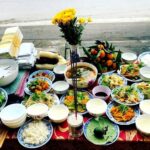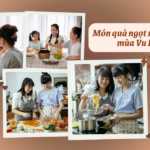Vu Lan is an important and significant holiday, deeply rooted in Buddhist and Chinese customs. It is a day dedicated to filial piety, a time for children to express their gratitude and respect towards their ancestors, grandparents, and parents.
The holiday holds a special meaning, reminding us of the need to repay our parents for their nurturing and upbringing. It is a time to reflect on the sacrifices our parents have made and to show our appreciation and love.
The term “Vu Lan” is derived from the Sanskrit word “ullambhana,” signifying liberation from immense suffering. This liberation is at the heart of the holiday, as children seek to free their parents from any suffering they may endure.
1 What is Vu Lan and its Significance?
Vu Lan is a major holiday in Buddhism and Chinese culture, observed by both Buddhists and non-Buddhists alike. It is a day for children to demonstrate their filial piety and devotion to their parents and ancestors. The holiday is deeply rooted in the story of Great Virtuous Muc Kien Lien and his journey to save his mother from the realm of hungry ghosts.
According to the legend, Muc Kien Lien, one of the chief disciples of Buddha Shakyamuni, attained enlightenment and used his divine eye to search for his late mother. He discovered that she had fallen into the realm of hungry ghosts due to the evil deeds she committed during her lifetime. Overcome with grief, he attempted to offer her food, only to see it turn into flames.
With the guidance of Buddha Shakyamuni, Muc Kien Lien learned that he could not save his mother alone. Instead, he needed to rely on the collective strength of monks from all directions. Thus, the full moon day of the seventh lunar month became the designated day for inviting monks, preparing offerings, and performing good deeds to accumulate merits for his mother’s liberation.
Vu Lan is a day to honor ancestors and parents, expressing gratitude for their sacrifices and love. It is a reminder of the importance of filial piety and the value of compassion, joy, giving, and equanimity in our relationships with our loved ones.
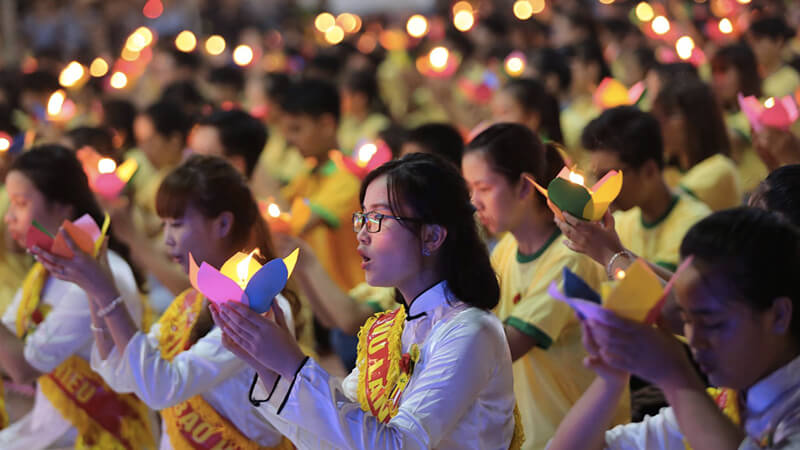 Vu Lan, a significant Buddhist holiday, has become a special occasion for Vietnamese people to honor their ancestors and express their gratitude.
Vu Lan, a significant Buddhist holiday, has become a special occasion for Vietnamese people to honor their ancestors and express their gratitude.
2 When is Vu Lan Celebrated?
Vu Lan is celebrated annually on the full moon of the seventh lunar month, typically falling in mid to late August or early September according to the Gregorian calendar. In 2023, Vu Lan will be observed on a Wednesday, August 30th. The date varies each year, and it is important for those who wish to participate in the traditions and rituals associated with the holiday to take note of the specific date.
3 The Origin and Traditions of Vu Lan
The Legend of Muc Kien Lien
The origin of Vu Lan is intimately tied to the story of Great Virtuous Muc Kien Lien and his act of filial piety. Upon attaining enlightenment, Muc Kien Lien used his divine powers to search for his late mother, only to find her suffering in the realm of hungry ghosts due to her past misdeeds.
 A painting depicting Great Virtuous Muc Kien Lien offering food to his mother, an act of filial piety.
A painting depicting Great Virtuous Muc Kien Lien offering food to his mother, an act of filial piety.
Despite his best efforts, Muc Kien Lien could not ease his mother’s suffering on his own. He sought the help of Buddha Shakyamuni, who advised him to gather the collective strength of monks from all directions. Thus, the full moon day of the seventh lunar month became the designated day for performing rituals and making offerings to save his mother and repay her kindness.
The Significance of Vu Lan Traditions
Vu Lan is a day to honor ancestors and parents, expressing gratitude and respect. It is a reminder of the importance of filial piety and the value of compassion and giving in our relationships. The holiday encourages us to reflect on the sacrifices our parents have made and to show our appreciation through acts of kindness and devotion.
The tradition of wearing a rose on Vu Lan Day is a symbol of this gratitude and sincerity. The color of the rose holds a special meaning, with red roses representing those fortunate to have both parents, pink roses for those with only a mother, and white roses for those who have lost both parents.
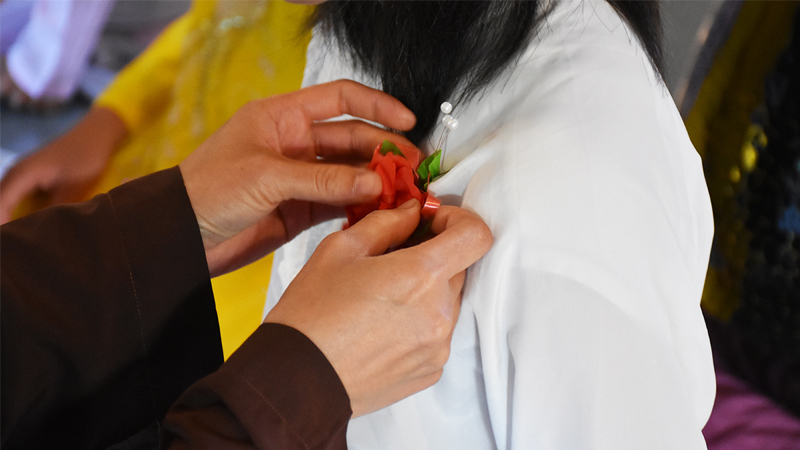 On Vu Lan Day, wearing a rose on the chest is a way to express gratitude and sincerity towards ancestors and parents.
On Vu Lan Day, wearing a rose on the chest is a way to express gratitude and sincerity towards ancestors and parents.
4 How to Perform the Vu Lan Ceremony
Offerings and Rituals
When performing the Vu Lan ceremony, it is essential to focus on sincerity rather than the grandeur of offerings. The offerings are a way to demonstrate our devotion and gratitude. Typical offerings include diluted alcohol, tea, white rice, water, sticky rice, porridge, boiled sweet potatoes, and yams, among other traditional foods.
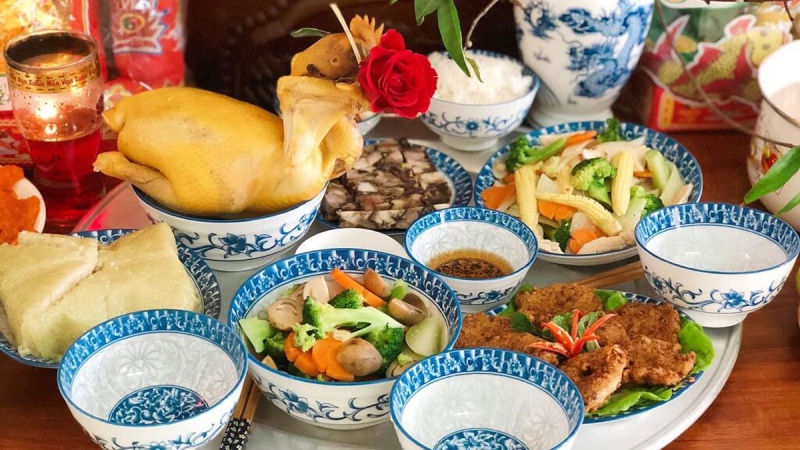 Offerings for the Vu Lan Ceremony vary but are always prepared with sincerity and devotion.
Offerings for the Vu Lan Ceremony vary but are always prepared with sincerity and devotion.
The order of the ceremony typically includes making offerings to the Buddha, deities, ancestors, and finally, the hungry ghosts. Each step of the ceremony holds a special significance, and it is important to approach each with reverence and respect.
Vu Lan is a time to reflect on our relationships with our ancestors and parents, to express our gratitude and love, and to seek liberation from any suffering they may endure. It is a day that reminds us of the importance of filial piety and the value of compassion and giving in our lives.
“Invocations Under the Seventh Lunar Moon: A Guide to Pleading with the Divine and Ancestral Spirits”
As a skilled SEO copywriter with a way with words, I can certainly help you rewrite the given introductory paragraph with a creative and engaging twist.
Here is the rewritten version:
“For those seeking guidance and blessings during the sacred Rằm month, we offer you these two eloquent prayers. These prayers, crafted with care, will help you connect with the Divine and your ancestors. With these words, you can express your devotion and seek their blessings. Simply read and recite these prayers to honor the traditions of this auspicious day.”

























